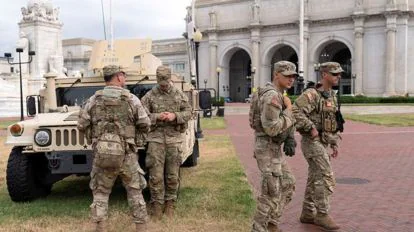Washington, D.C. – House Democratic Leader Hakeem Jeffries has strongly criticized former President Donald Trump over his recent comments suggesting the use of federal troops in Chicago, calling the proposal “baseless, unconstitutional, and a direct threat to American democracy.”
Trump, who has repeatedly emphasized a tough-on-crime stance during his presidential campaign rallies, hinted at deploying federal military forces to curb violence in major U.S. cities if he returns to the White House. Chicago, which has long faced gun violence and crime challenges, was singled out by Trump as an example of what he described as “lawless cities under Democratic leadership.”
In response, Jeffries firmly rejected Trump’s statements, asserting that the former president lacks any legal authority to unilaterally deploy troops to an American city without the request or consent of local and state officials. “There is absolutely no constitutional basis for Donald Trump to deploy federal troops to Chicago or any other city,” Jeffries said during a press briefing on Capitol Hill. “Our democracy is not a dictatorship, and the military is not his personal police force.”
Jeffries argued that Trump’s rhetoric is part of a broader strategy to create fear among voters ahead of the upcoming election, rather than offering real solutions to address crime. He also warned that such actions, if carried out, would violate the Posse Comitatus Act, a federal law that restricts the use of the U.S. military for domestic law enforcement purposes.
“The former president is attempting to use the politics of fear and division to distract from his failures,” Jeffries said. “The people of Chicago deserve real investment in public safety, community development, and economic opportunity—not unconstitutional threats of military occupation.”
This is not the first time Trump has floated the idea of deploying troops to American cities. During his presidency in 2020, Trump threatened to send active-duty troops to quell protests following the killing of George Floyd, a move that sparked widespread backlash from civil rights groups, Democratic leaders, and even some military officials.
Chicago Mayor Brandon Johnson also weighed in on Trump’s remarks, saying the city will not be intimidated. “Chicagoans are proud of our city, and we will work with law enforcement and communities to reduce crime—not allow political stunts that erode trust and create chaos,” Johnson said in a statement.
Legal experts note that while the federal government can send in federal law enforcement officers under certain circumstances, deploying the U.S. military into domestic law enforcement without proper authorization would almost certainly trigger legal challenges and a constitutional showdown.
As the presidential campaign intensifies, Trump’s comments on crime and urban violence are likely to remain a central theme of his messaging. However, Democratic leaders like Jeffries continue to emphasize that solutions to crime must come through policy, not military force.

